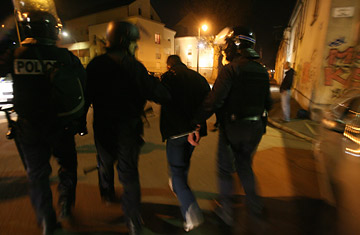
Police officers detain a young man in Villiers-le-Bel, outside Paris
Is France an increasingly authoritarian society whose police forces are protected from frequent charges of abuse — ranging from racial insult to homicide? That's what Amnesty International maintains in a new report issued Thursday. According to the report, abuse complaints against French police are routinely dismissed, and a tacit immunity allows accused officers to counter-attack the minorities, immigrants, and economically disadvantaged people who constitute the majority of plaintiffs.
"What we describe is an environment in which the absence of an independent investigation system has left police officers virtually immune to prosecution or reprimand and in nearly open conflict with certain sections of society as a consequence," says David Diaz-Jogeix, deputy director of Amnesty International's Europe and Central Asia program. "The failure of the system to fully examine complaints is now leading more and more lawyers to dissuade clients from reporting abuse, with warnings that it will result in nothing and may even generate legal counter-attack." (See pictures of Pakistan's lawyers celebrating.)
Amnesty's report, "France: Police Above the Law," cites hard-to-obtain official statistics on abuse investigations culled from a variety of legal sources and studies. Those figures indicate charges of brutality are rarely substantiated or punished. It says that of 639 inquiries of police mistreatment in 2006, a mere eight cases resulted in the accused being dismissed from the force. In 2005 — when Amnesty first sounded the alarm about the problem — 16 out of 663 investigations led to the ouster of accused cops. By contrast, there's been an explosion in cases and convictions of "outrage," an offense based on anything from a bystander protesting unjustified arrest or violent treatment of someone by police to a suspect slandering peace officers or other public officials. Out of 31,800 court cases filed by police or prosecutors in 2006 for "outrage," nearly 14,000 ended with conviction — half of those involving jail terms. (See pictures of the British police clashing with protesters in London.)
"Not only are victims of police violence being denied justice, but both they and anyone else who denounces the mistreatment often find themselves under attack for insulting a law enforcer when those accusations wind up discounted," Diaz-Jogeix explains. That happens, he charges, because preliminary inquiries are usually handled by the police themselves and so inspectors are often less than dogged in confirming accusations against their peers.
"By the time equally hesitant prosecutors and investigating magistrates get them, there usually isn't enough in the dossier for a case to be tried," Diaz-Jogeix says. "There is no independent alternative to challenge rulings that the abuse accusations are unfounded. That allows police and their superiors to claim the role of victim, and file suit for 'outrage' against the people whose rights were abused by police violence in the first place."
French law officials deny the report's allegations of de facto police immunity, and also protest the characterization of the review process as complicit to the accused. (See pictures of France celebrating Bastille Day.)
"All complaints are systematically investigated in a thorough manner, during which any and all evidence of violations are diligently gathered and delivered to a prosecutor and investigating judge — both of whom are independent of police forces," notes Guillaume Dider, spokesman for France's Justice Ministry. "I categorically deny that there is any indulgence shown towards police forces who violate the law and abuse the rights of citizens."
One problem is that Amnesty's documentation of the problem is less than complete. Though the dismissal figures of French police officers accused of brutality are remarkably low in relation to the total number of complaints, Amnesty says getting similar data from other countries is just as difficult as in France — making it impossible to compare that French record with other nations. But "even if there were comparative reports, we'd contest the conclusions drawn in this one as woefully incorrect," says Dider.
The study's examination of 14 cases of police brutality — one of which resulted in a suspect's death — gives compelling human voices to the abuse. But however damning the information contained in those accounts may be, the report provides little evidence to prove that the officers cleared in the hundreds of abuse cases deemed unsubstantiated each year benefited from a systemic whitewash.
Still, Amnesty's allegations of increasingly aggressive French police activity have not arisen in a void. President Nicolas Sarkozy has largely fulfilled election pledges to impose law and order and respect of authorities by encouraging maximalist enforcement. Even prior to his election, Sarkozy introduced a performance-based reward system that promotes police officers based on various on-duty criteria — including arrest rates. (See pictures of Sarkozy in the U.K.)
And just last month the automotive magazine Auto Plus reported that traffic police are routinely given arrest and fine quotas for moving violations. That, Auto Plus contends, makes ticketing drivers for bogus offenses almost obligatory for cops who fear their promotion relies on meeting targets. Interior Ministry officials have acknowledged that quota systems exist in some localities, but say they are probably useful in bringing French road violence numbers down further.
"It's all part of a very clear attitude that has taken hold in the past few years that arrests and prosecution are preferable to prevention," says Amnesty's Diaz-Jogeix. "Quotas are a reflection of that," he adds. "They are a numerical determination of how many people authorities think must be breaking the law, rather than adding up those actually caught in violation." Based on the findings of Amnesty's report, the next quota French officials may want to consider is one for cops who've become too used to making the law, rather than enforcing it.
